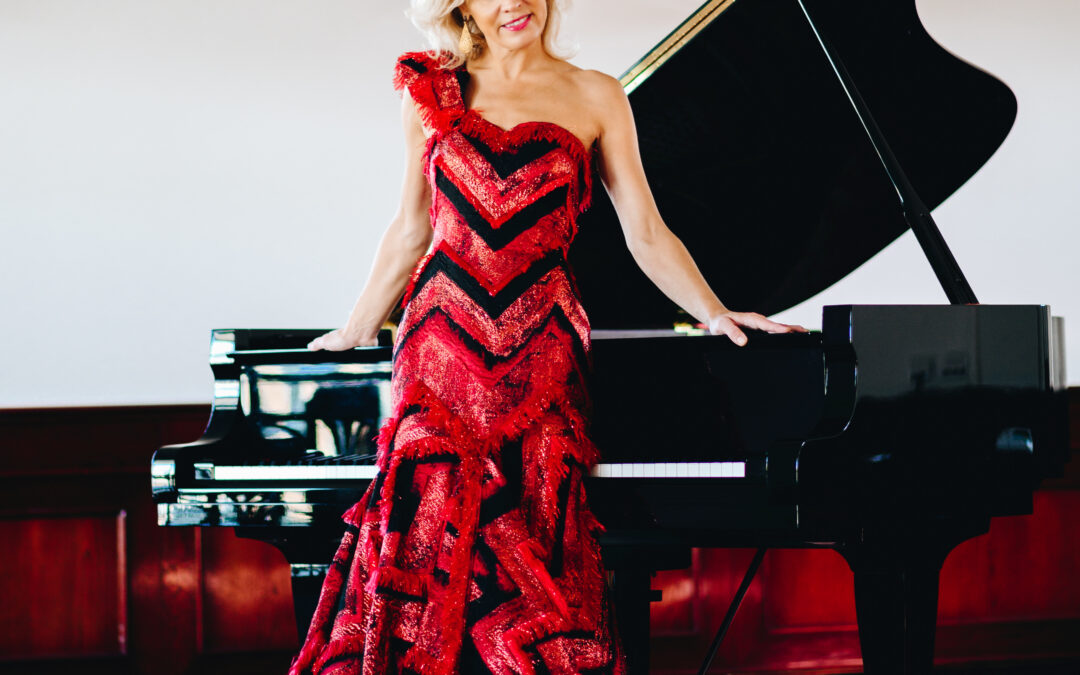By Jeff Maisey
This year, the Virginia Arts Festival will pay homage to Russian composer Sergei Rachmaninoff’s 150th birthday as part of its Chamber Music Series of concerts.
Front and center for most of these performances is the phenomenal, often animated pianist Olga Kern.
Kern will perform in solo recital May 7 at Sandler Center, and then with the Dali Quartet at Norfolk Academy (May 11), and then with a quartet of top notched players in Tianwa Yang (violin), Sterling Elliott (cello), Debra Wendells Cross (flute), and Darrin Milling (trombone) on May 23 at Hixon Theater.
These performances will be complimented with an additional morning-time (10:30 AM) schedule known as the Coffee Concert Series at Hixon Theater (May 10), St. John’s Episcopal Church (May 12), Ohef Sholom Temple (May 25), Williamsburg Library (May 26), and Hennage Auditorium at the Art Museums of Colonial Williamsburg (June 7).
I recently spoke with Olga Kern by phone from her home in New York City. Following is an excerpt from our conversation.
VEER: I understand you have a family connection to composer Sergei Rachmaninoff. Would you share that part of your family history?
Olga Kern: Rachmaninoff was a good friend of my great grandmother (Vera Pushechnikova). She was a mezzo-soprano. They performed together quite a lot. He was accompanying her, so that was very special. In two of Rachmaninoff’s memoirs she is mentioned and there are the dates that they played.
Every time I perform Rachmaninoff’s music I feel her spirit is with me.
VEER: When you were 17 years old, Olga, you won first prize in the first Rachmaninoff International Competition. Do you recall which piece of music you performed, and given your age and family connection to the composer, what did that award mean to you?
Olga Kern: That was a really important competition for me. I was so much into Rachmaninoff’s music. This competition was all Rachmaninoff music.
It was two solo recitals and chamber music. I played Rachmaninoff’s cello sonata. The final round was Rachmaninoff’s 3rd piano concerto with an orchestra.
I was just 17. Being into Rachmaninoff’s music; I read about his life. It was such an amazing experience for me. It helped me to grow up and understand his ideas and his compositions.
VEER: As you grew as a pianist and gained more experience as a performer, learning the works of many other composers in the process, what would you say is Rachmaninoff’s brilliance as a composer? What set him apart from others?
Olga Kern: He knew exactly how to write for piano. If you look at his scores you’ll see it’s almost black sometimes — it’s that many notes.
At first it’s scary when you are reading it, but then it feels comfortable because he knew exactly what the piano can or cannot do.
He really put the piano in a special place — the same as Chopin and Beethoven. He made the piano very special in all his compositions for piano.
In other compositions for symphonies are absolutely amazing. The harmonies, the language he used…it’s just very romantic.
Knowing that so many Hollywood movies took his wonderful melodies for their introductions and music background. He was a really incredible melodist.
The voice is very important. He loved working with singers. It shows in his solo piano compositions. He was such a genius composer for the piano.
Being in the United States, he also learned so much from jazz. It was very exciting for him. He was excited about new harmonies. You can hear the influence of Gershwin on his late compositions.
It was very unique for him to merge what he was doing with this new modern language from the United States.
He was such a great musician so he could adopt all of these things in his music. The last solo piece he wrote you can hear this incredible admiration for jazz and blues — all from American culture.
VEER: Your first performance this year is solo at the piano. What can you share about the repertoire you’ve selected?
Olga Kern: It is a total homage to Rachmaninoff.
I will honor his name not just as a great composer but also as a great pianist.
I decided in the first half to do a set of Rachmaninoff, but then I’ll play two composers which were very important in his life. I’ll do Schumann’s “Carnival” because Rachmaninoff had the most incredible recording of Schumann’s “Carnival.” This recording inspired many, many pianists, including me.
I heard this recording many times and I must say that it is unique in the traditions of Schumann.
Then I will finish the first half with Gershwin because as I already mentioned Rachmaninoff really admired Gershwin and he was really sad that Gershwin passed away that soon.
I will play Gershwin’s “Prelude.”
The second half will be all Rachmaninoff, from his early opuses to his compositions for solo piano.
I wanted to give a fuller range of him as a musician, not just a great composer.
I think it’s a wonderful program.
VEER: Have you ever considered composing a piece of music in the style of Rachmaninoff, and then release it as a new recording?
Olga Kern: (laughing) It’s a very difficult to compete with such a genius composer.
I already wrote a few pieces: a piano sonata. I started to write a piano concerto. I have a few piano and voice songs. But I feel I’m not ready to show it to my public.
I think I need to have a few more years to really revise this and see how I feel about it, and maybe one day perform it and maybe record it.
I think every musician at certain times in their careers…we should all try to compose something because it is part of music making. It is very important.




